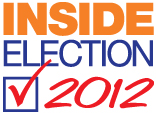You have /5 articles left.
Sign up for a free account or log in.
WASHINGTON — After months of vicious campaigning, the Congressional elections Tuesday maintained the status quo. Democrats held on to their majority in the Senate, and Republicans to their majority in the House of Representatives on Tuesday night. In the coming weeks, Congress will face a monumental task with ramifications for many higher education programs.
The “fiscal cliff,” mandatory spending cuts and expiring tax breaks that take effect Jan. 2, needs to be dealt with. How a Congress that was unable to reach an agreement on deficit reductions a year ago might do so now is still unclear. But in the next year, the legislators will tackle several higher education budget problems, including a shortfall in the Pell Grant program and a scheduled doubling of the subsidized student loan interest rate in July.
"Continued stalemate is certainly a possibility on Capitol Hill despite the huge impact that the fiscal cliff will have if we go over it," Terry Hartle, senior vice president for government and public affairs at the American Council on Education, said as the dust settled on the election results late Tuesday night. The mandatory spending cuts will have the biggest impact at universities that depend on federally funded research dollars, because the Pell Grant is exempt from the cuts for the first year. But the expiring Bush-era tax cuts include several that help families save and pay for college, Hartle said.
The new Congress's first year is likely to be full of budget crises for higher education. After the mandatory spending cuts, the interest rate on federally subsidized student loans is scheduled to double on July 1. Three months later, on October 1, the Pell Grant faces a significant budget gap.
If the past two years are any guide, the parties’ positions are fairly clear: Senate Democrats will oppose most reductions to higher education programs, while House Republicans will seek cuts in the name of reducing domestic spending.
"It's hard to imagine a change in direction from Congress beyond what we've seen in the 112th Congress," said Cynthia Littlefield, vice president for federal relations at the Association of Jesuit Colleges and Universities. "But because you're going to have an infusion of new members at any rate, that often may dictate some alterations and changes."
Over the next term, Congress is also likely to start the process of renewing the Higher Education Act, the law governing federal financial aid, although that will not be accomplished by the time it expires in 2013. Senator Tom Harkin, an Iowa Democrat who will remain the chairman of the Committee on Health, Education, Labor and Pensions, has said he plans to start holding hearings on the act’s renewal; however, many observers expect a narrower fix for the Pell funding shortfall without the broader legislative action of a full renewal in the next two years.
"The real question is, will anything be different or get done?" Littlefield said. "It's our hope that people will realize it's over, move forward and try to do the right thing."
Many senators who play key roles on higher education were not up for re-election this year. But Ohio Senator Sherrod Brown, a Democrat who has sponsored higher education legislation and hosts an annual meeting of his state's colleges and universities, won a second term.
In the House of Representatives, two Democrats who are supportive of higher education and were fighting in tight races -- Representative John Tierney of Massachusetts and Representative Tim Bishop of New York -- both held on to win another term. Other key figures in the House, including John Kline, chairman of the House Committee on Education and the Workforce, also retained their seats.
"We will be back where we started, I suppose, with a very narrowly divided government with very different views about the role and place of the federal government in American life," Hartle said.




